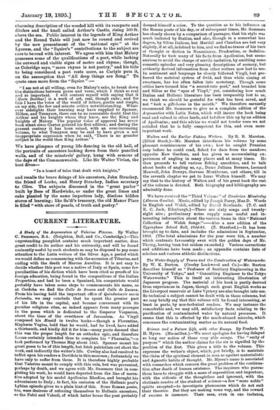CURRENT LITERATURE.
A Study of the Argonautzca of Vcderies Flaccus. By Walter C. Summers, B.A. (Deighton, Bell, and Co., Cambridge.)—This unpretending pamphlet contains much important matter, does great credit to its author and his university, and will be found eminently useful by such students as may be disposed to pay some attention to the Latin writers of the Silver Age, a period which we would define as commencing with the accession of Tiberius, and ending with the death of Marcus Aurelius. It is not easy to decide whether this poet was a native of Italy or Spain, some few peculiarities of his diction which have been cited as proofs of his foreign education, being found in the compositions of the Italian _Propertius, and had he been a Spaniard, his compatriots would probably have taken some steps to commemorate his name, as at Cordoba we find the Calls de Seneca and Calle de Lucano. From his having held the important office of Quindecinwir sacris faciundis, we may conclude that he spent the greater part of his life in the capital, and became conversant with its peculiar religious rites, as indeed appears from many passages in the poem which is dedicated to the Emperor Vespasian, about the time of the overthrow of Jerusalem. As Virgil composed his lEneid in twelve books—though a Florentine, Maphasus Vegius, held that he would, had he lived, have added a thirteenth, and kindly did it for him—many poets deemed that this was the proper length for an orthodox epic, and therefore Lucan -certainly intended thus to complete his " Pharsalia,"—a task performed by Thomas May about 1645. Spenser meant his great poem to be of this length, but Irish patriotism cut short the work, and indirectly the writer's life. Cowley also had resolved to inflict upon his readers a Davideis in this measure; fortunately we have only to suffer from three. It is therefore highly probable that Valerius meant to comply with this rule, but was prevented, perhaps by death, and we agree with Mr. Summers that in com- pleting his work, he would have departed from the line of narra- tive adopted by his model Apollonius Rhodius, and brought his adventurers to Italy ; in fact, his omission of the Hellenic poet's Lybian episode gives us a plain hint of this. Some Roman genies, too, were desirous of referring themselves to Hellenic ancestors, as the Fabii and Valerii, of which latter house the poet probably. deemed himself a scion. To the question as to his influence on the Roman poets of his day, or of subsequent times, Mr. Summers has clearly shown by a comparison of passages, that his style was much imitated by Statius, and also, though in a somewhat less degree, by Silius Italicus, but Martial and Claudian are but very slightly, if at all, indebted to him, and we find no traces of his turn of thought or diction in Nemesianus, Prudentius, or Sedulius. Naturally he took many of his facts from Apollonius, but seems anxious to avoid the charge of servile imitation, by omitting some romantic episodes and very pleasing descriptions of scenery, but evidently derived information from other writers now lost to use. In sentiment and language he closely followed Virgil, but pre- ferred the metrical system of Ovid, and thus while aiming at sweetness, has too often fallen into monotony. Though some critics have termed him "a second-rate poet," and branded him and Silius as the "apes of Virgil," yet, considering how much Italian and Hellenic literature has been irreparably lost to us, we think we should be grateful for what has been saved, and not "look a gift-horse in the mouth." We therefore earnestly recommend Mr. Summers to give us a complete edition of the Argonaulica with Latin Notes, which will insure the book being read and valued in other lands, and to follow this up by an edition of Apollonius; and this advice we would not tender were we not satisfied that he is fully competent for this, and even more important work.


































 Previous page
Previous page